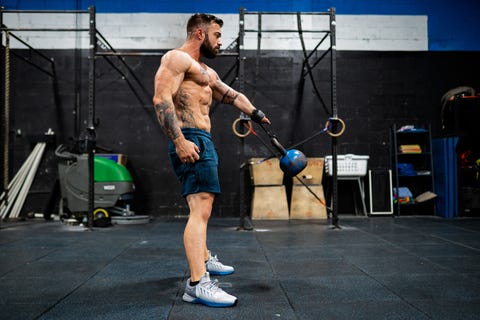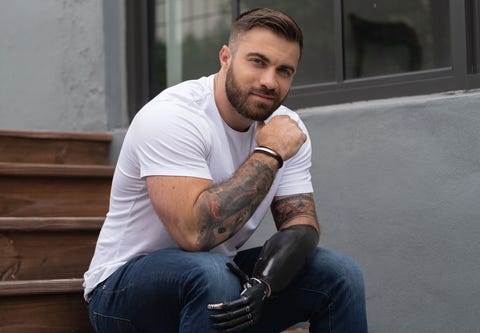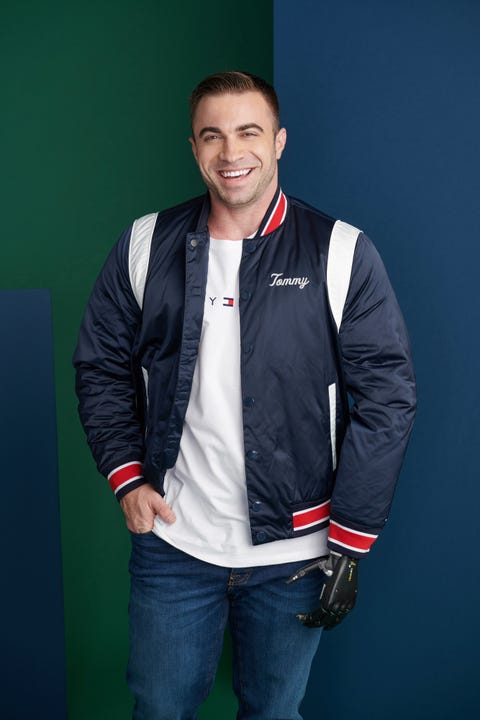Chris Ruden was born with a congenital birth defect which means he only has two fingers on his left hand. He struggled with insecurity and hid his disability for years, but after finding a sense of purpose and self through weightlifting and fitness, he has since become a motivational speaker and author. He competed in Season 1 of The Titan Games, and just walked in the Runway of Dreams fashion show. Here, Chris shares with Men’s Health how his journey to self-acceptance meant taking the good with the bad:
I hid my hand for over 17 years. Honestly it consumed my life. It was to the point where if I had my backpack on, I would put my hand in my pocket and I would have to ask to go to the bathroom just so I could take my backpack off— I was that embarrassed and ashamed of the way I looked. I felt broken, but pretended like I was fine with this false persona of confidence that I never believed but other people did. I thought that if I built muscle I would be happy with the way I looked, but it wasn’t until I realized that muscles don’t replace confidence that I started to accept myself for who I was, through the process of making myself better and bigger while still appreciating my differences.
I eventually decided to share my story and show my hand in a YouTube video in 2017. I’ll never forget when I was keynoting an event as a speaker, I was still hiding my hand under a glove, and a young girl grabbed my residual thumb over my glove, and looked at me and smiled, and said “You don’t have to hide.” That moment killed me because it was like the first time someone actually saw me. A short while after that I told myself if I ever got a prosthetic arm I would take the gloves off, and when that finally came through I committed to it— I just never knew that video was going to go viral and all these media outlets were going to show it. I truly do attribute being thrown into the deep end as one of the reasons that I am now comfortable to live my life without a mask or glove.
I hit a 640-pound deadlift in front of 15,000 people as the only disabled athlete in that event at the Arnold Sports Festival, but that accomplishment dulls in comparison to being able to go to the grocery store without hiding my disability anymore.

Lifting and powerlifting have taught me that failing is OK— but being a failure is not. It taught me that even though you might not look like everyone around you, you can still adapt, and build a physique and a mentality and a life on your terms. I always felt like a one-handed guy living in a two-handed world, so I knew I had to adapt around gym machines that were not designed for people with disabilities. I found ways to create different angles and versions of exercises, and then eventually found a lifting hook that would support a 675-pound deadlift. I love working with the adaptive community in and outside of the fitness space, and when I get hired to speak at events about overcoming adversity I always bring up our ability to adapt in any environment.
Something else which has taught me to be constantly adaptable is the fact that I live with Type 1 diabetes, which is not a daily thing; it is literally a minute-by-minute condition. I have a continuous glucose monitor on my body that links to my phone constantly telling me what my blood sugar is as well as three different kinds of insulin including an inhalable insulin. The second my blood sugar falls out of range either too high or too low they can put me in not only an uncomfortable position but a dangerous position, and I think people forget the severity of Type 1 diabetes at times. That being said, I am fortunate to work with many Type 1’s around the country as a speaker and as a coach, so I do my best to manage a condition that I never asked for and feel like I’m doing pretty damn good. I watch my macronutrient intake which really helps control my blood sugar, but I still enjoy donuts here and there when I’m not competing.

While a lot of our circumstances are not our fault, they are unfortunately our responsibility to deal with in the best way that we can. I do believe there can be a tendency towards “toxic positivity,” where people attempt to invalidate struggle and real feelings. Not everyone has to be a superhero, and not everyone will have a Disney fairytale ending, but I truly think that everyone has the potential and the resourcefulness to improve their quality of life regardless of their circumstances— even if it’s just improving the internal narrative that most of us tend to struggle with.
I have a book coming out soon called The Upper Hand, and it’s all about improving self-communication so that you can leverage limitations to your advantage, regardless of circumstances. This is the philosophy that has carried me through the darkest times that I’ve ever gone through.

When most people hear the word “disability,” they usually don’t think “strong” or “sexy” or “powerful.” I’m determined to change that. Whether it’s in the fashion industry with Runway of Dreams, where brands like Tommy Hilfiger, Nike and Zappos Adaptive put inclusion first by making clothing for people with disabilities, or productions like The Titan Games, where they give equal chances to people with unequal circumstances to show that diversity is normal. True inclusion is not thinking twice about a leader because they have a disability, and not assuming that a person with a disability is somehow less than because of their circumstances.
Ableism runs deep in our society, and I hope to break that stereotype with every venture I pursue. I have big goals of getting on magazine covers and working with different apparel brands to develop adaptive clothing lines because I vowed to be the person I never had growing up and I know that if 12-year-old me saw 30-year-old me on the cover of a magazine, and saw a popular company making apparel for people with different abilities, I would’ve gone through a lot less pain. I hope to give that back to the world someday.


Source: Read Full Article
